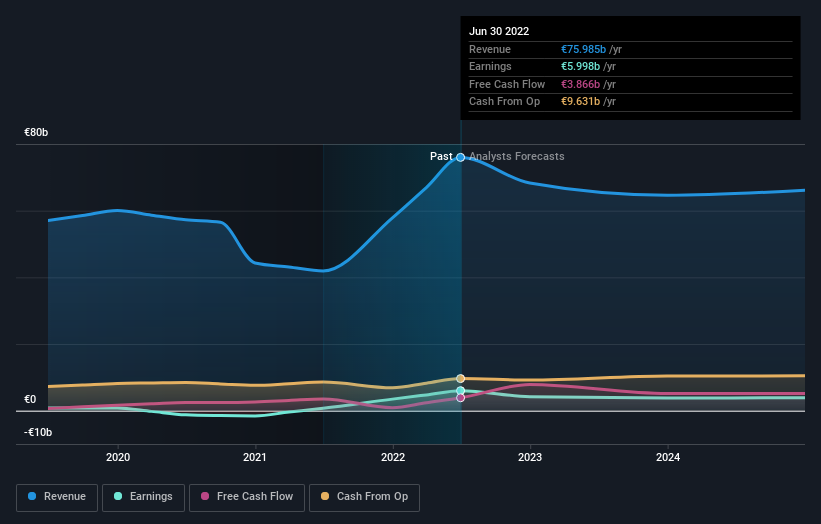
Today we're going to take a look at the well-established ENGIE SA (EPA:ENGI). The company's stock saw a decent share price growth in the teens level on the ENXTPA over the last few months. With many analysts covering the large-cap stock, we may expect any price-sensitive announcements have already been factored into the stock’s share price. However, could the stock still be trading at a relatively cheap price? Let’s take a look at ENGIE’s outlook and value based on the most recent financial data to see if the opportunity still exists.
Check out the opportunities and risks within the XX Integrated Utilities industry.
Is ENGIE Still Cheap?
Good news, investors! ENGIE is still a bargain right now according to my price multiple model, which compares the company's price-to-earnings ratio to the industry average. I’ve used the price-to-earnings ratio in this instance because there’s not enough visibility to forecast its cash flows. The stock’s ratio of 5.41x is currently well-below the industry average of 11.53x, meaning that it is trading at a cheaper price relative to its peers. However, given that ENGIE’s share is fairly volatile (i.e. its price movements are magnified relative to the rest of the market) this could mean the price can sink lower, giving us another chance to buy in the future. This is based on its high beta, which is a good indicator for share price volatility.
Can we expect growth from ENGIE?

Future outlook is an important aspect when you’re looking at buying a stock, especially if you are an investor looking for growth in your portfolio. Although value investors would argue that it’s the intrinsic value relative to the price that matter the most, a more compelling investment thesis would be high growth potential at a cheap price. However, with an extremely negative double-digit change in profit expected over the next couple of years, near-term growth is certainly not a driver of a buy decision. It seems like high uncertainty is on the cards for ENGIE, at least in the near future.
What This Means For You
Are you a shareholder? Although ENGI is currently trading below the industry PE ratio, the adverse prospect of negative growth brings about some degree of risk. I recommend you think about whether you want to increase your portfolio exposure to ENGI, or whether diversifying into another stock may be a better move for your total risk and return.
Are you a potential investor? If you’ve been keeping tabs on ENGI for some time, but hesitant on making the leap, I recommend you dig deeper into the stock. Given its current price multiple, now is a great time to make a decision. But keep in mind the risks that come with negative growth prospects in the future.
If you want to dive deeper into ENGIE, you'd also look into what risks it is currently facing. For instance, we've identified 3 warning signs for ENGIE (1 is significant) you should be familiar with.
If you are no longer interested in ENGIE, you can use our free platform to see our list of over 50 other stocks with a high growth potential.
Valuation is complex, but we're here to simplify it.
Discover if Engie might be undervalued or overvalued with our detailed analysis, featuring fair value estimates, potential risks, dividends, insider trades, and its financial condition.
Access Free AnalysisHave feedback on this article? Concerned about the content? Get in touch with us directly. Alternatively, email editorial-team (at) simplywallst.com.
This article by Simply Wall St is general in nature. We provide commentary based on historical data and analyst forecasts only using an unbiased methodology and our articles are not intended to be financial advice. It does not constitute a recommendation to buy or sell any stock, and does not take account of your objectives, or your financial situation. We aim to bring you long-term focused analysis driven by fundamental data. Note that our analysis may not factor in the latest price-sensitive company announcements or qualitative material. Simply Wall St has no position in any stocks mentioned.
About ENXTPA:ENGI
Engie
ENGIE SA engages in the power, natural gas, and energy services businesses.
Good value average dividend payer.


